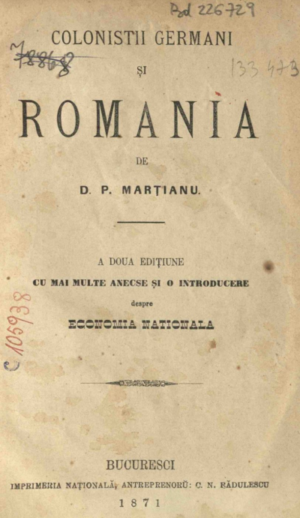Historicising the “Colonial” in Nineteenth Century Romania

Event: Public Seminar
Location: Zoom
11 October 2024, 16.00-18.00 (Bucharest time)
Andrei-Dan SORESCU, NEC alumnus
Postdoctoral Researcher, ERC research project “Transnational histories of ‘corruption’ in Central-South-East Europe (1750-1850)”
Join Zoom Meeting
https://us02web.zoom.us/j/81120608465?pwd=eGarDSa1joMZUD1NyS6f0xDqnHztHf.1
Meeting ID: 811 2060 8465
Passcode: 790395
Intellectual histories of “empire” have long taken centre stage in scholars’ attempts to make sense of its attending “-ism” and the long shadows it continues to cast. By contrast, and with less definitional precision as a separate yet connected process, the meanings that the “colonial” held as a category for historical actors themselves have been left comparatively under-researched. That the two are – and were – deeply entwined is a given. And yet, the historical semantics of “colony” and “colonisation” deserve particular attention. As the politics, ethics, and pragmatics of “de-colonising” institutions, knowledge, and cultural praxis have in recent years gripped public imagination, my contention is that a deeper knowledge of what “the colonial” meant in its past, original context(s) is equally necessary.
The present intervention therefore takes nineteenth-century Romania as a surprisingly productive case-study for investigating the meanings that “colony” and “colonisation” could hold, as pervasively recurring concepts in public discourse. From the self-imagining of the nation’s origins as the outcome of Roman colonisation to envisioning the “colonial” potential of the Dobruja as a province, or by anxiously connoting German or Jewish presence as potentially “colonising”, the literate Romanian public sphere ceaselessly returned to, and attempted to define what these keywords could stand for. The rhetorics of colonial presence in the nation’s past, present, and future remained salient across long nineteenth century, I will argue, even in a country not directly involved in European processes of imperial expansion. Charting how, and which contexts “colony” and “colonisation” were used, and whether their meaning shifted, or was broadened across time, the present talk aims to highlight the often surprising texture of historical discourse, and how the two concepts remained hidden in plain sight for subsequent historical investigations.
This event is organized within the framework of the ERC research project Transnational histories of ‘corruption’ in Central-South-East Europe (1750-1850) hosted by New Europe College.